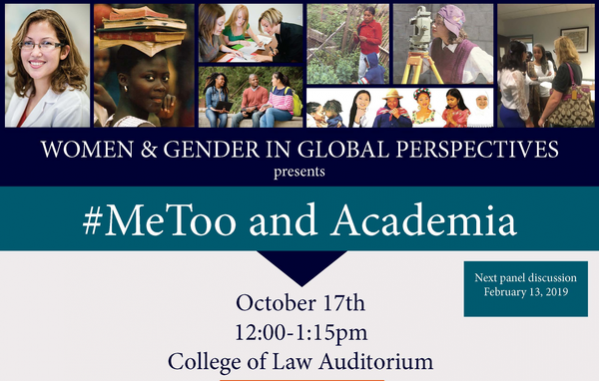U Of I Law Professor: Power Dynamics Make Academia ‘Ripe For Abuse’

The U of I Women and Gender in Global Perspectives Program will host two public events on the issue of sexual harassment in academia. The first will take place on October 17, 2018, at the U of I College of Law auditorium in Urbana. Women and Gender In Global Perspectives website
In the wake of the #MeToo movement, more victims are coming forward to report sexual harassment and assault.
But when the victim is a student and the abuser is a professor, the power differential can be a barrier to students speaking out, according to the organizers of an upcoming “#MeToo and Academia” panel discussion at the University of Illinois at Urbana-Champaign.
The U of I Women and Gender in Global Perspectives Program will host two public events on the issue of sexual harassment in academia. The first will take place Wednesday at the U of I College of Law auditorium in Urbana.
Colleen Murphy is director of the WGGP and a professor of law, philosophy and political science at the U of I. She said graduate students’ careers are, in a literal sense, in the hands of their advisors.
That’s because they strongly depend on their advisors and thesis committee members to write strong letters of recommendation and sign off on their dissertations, both of which are critical to getting a good job after school. If a student is a victim and brings forth allegations against one of these professors, it could jeopardize their entire career.
“It’s a kind of environment that can be more conducive to certain kinds of exploitation,” said Murphy.
One of the panelists scheduled to speak Wednesday is U of I law professor Lesley Wexler. She’s the co-author of a journal article on how the #MeToo movement “opened the floodgates to a modern day reckoning with sex discrimination in the workplace.”
Wexler said the power differential between students and professors makes academia "ripe for abuse." Additionally, strong job protections for tenured professors create challenges when it comes to addressing sexual harassment in academia.
“The reason we have strong tenure protections are to prevent politically motivated firings,” Wexler said. “But on the other hand, it can also make it quite difficult to discipline professors who are found to engage in bad behavior but not fireable offenses.”
Wexler said people who attend the “#MeToo and Academia” event can ask questions, learn about resources on campus to report sexual harassment and gain a better understanding about behaviors that are unlawful.
To victims of sexual harassment and assault, Wexler said her advice is to try to find others who can substantiate the claims, keep good documentation of evidence, including writing things down when they occur, and to remember that there is power in numbers.
Murphy said the goal of the upcoming events is to start a conversation.
“We want to raise awareness that the #MeToo movement is a movement that’s relevant for the academic context,” she said.
Follow Christine on Twitter: @CTHerman
Links
- Reflections On Sexual Harassment In Illinois Government And Politics; Black Panther Preview
- Sexual Harassment Researcher: Most Workplace Training Falls Short
- Does Sexual Harassment Training Actually Work?; Rep. Bill Foster On Funding For National Labs
- Illinois Lawmakers To Combat Sexual Harassment
- Life After Hate; Sexual Harassment In The Sciences; Severe Weather & Tornadoes
